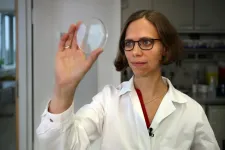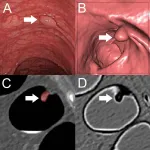(Press-News.org) Having a memory of past events enables us to take smarter decisions about the future. Researchers at the Max-Planck Institute for Dynamics and Self-Organization (MPI-DS) and the Technical University of Munich (TUM) have now identified how the slime mold Physarum polycephalum saves memories - although it has no nervous system.
The ability to store and recover information gives an organism a clear advantage when searching for food or avoiding harmful environments. Traditionally it has been attributed to organisms that have a nervous system.
A new study authored by Mirna Kramar (MPI-DS) and Prof. Karen Alim (TUM and MPI-DS) challenges this view by uncovering the surprising abilities of a highly dynamic, single-celled organism to store and retrieve information about its environment.
Window into the past
The slime mold Physarum polycephalum has been puzzling researchers for many decades. Existing at the crossroads between the kingdoms of animals, plants and fungi, this unique organism provides insight into the early evolutionary history of eukaryotes - to which also humans belong.
Its body is a giant single cell made up of interconnected tubes that form intricate networks. This single amoeba-like cell may stretch several centimeters or even meters, featuring as the largest cell on earth in the Guinness Book of World Records.
Decision making on the most basic levels of life
The striking abilities of the slime mold to solve complex problems, such as finding the shortest path through a maze, earned it the attribute "intelligent". It intrigued the research community and kindled questions about decision making on the most basic levels of life.
The decision-making ability of Physarum is especially fascinating given that its tubular network constantly undergoes fast reorganization - growing and disintegrating its tubes - while completely lacking an organizing center.
The researchers discovered that the organism weaves memories of food encounters directly into the architecture of the network-like body and uses the stored information when making future decisions.
The network architecture as a memory of the past
"It is very exciting when a project develops from a simple experimental observation", says Karen Alim, head of the Biological Physics and Morphogenesis group at the MPI-DS and professor on Theory of Biological Networks at the Technical University of Munich.
When the researchers followed the migration and feeding process of the organism and observed a distinct imprint of a food source on the pattern of thicker and thinner tubes of the network long after feeding.
"Given P. polycephalum's highly dynamic network reorganization, the persistence of this imprint sparked the idea that the network architecture itself could serve as memory of the past", says Karen Alim. However, they first needed to explain the mechanism behind the imprint formation.
Decisions are guided by memories
For this purpose the researchers combined microscopic observations of the adaption of the tubular network with theoretical modeling. An encounter with food triggers the release of a chemical that travels from the location where food was found throughout the organism and softens the tubes in the network, making the whole organism reorient its migration towards the food.
"The gradual softening is where the existing imprints of previous food sources come into play and where information is stored and retrieved", says first author Mirna Kramar. "Past feeding events are embedded in the hierarchy of tube diameters, specifically in the arrangement of thick and thin tubes in the network."
"For the softening chemical that is now transported, the thick tubes in the network act as highways in traffic networks, enabling quick transport across the whole organism", adds Mirna Kramar. "Previous encounters imprinted in the network architecture thus weigh into the decision about the future direction of migration."
Design based on universal principles
"Given the simplicity of this living network, the ability of Physarum to form memories is intriguing. It is remarkable that the organism relies on such a simple mechanism and yet controls it in such a fine-tuned manner," says Karen Alim.
"These results present an important piece of the puzzle in understanding the behavior of this ancient organism and at the same time points to universal principles underlying behavior. We envision potential applications of our findings in designing smart materials and building soft robots that navigate through complex environments", concludes Karen Alim.
INFORMATION:
Publication:
Encoding memory in tube diameter hierarchy of living flow network
Mirna Kramar and Karen Alim
PNAS, 22.02.2021 - DOI: 10.1073/pnas.2007815118
During ice ages, the global mean sea level falls because large amounts sea water are stored in the form of huge continental glaciers. Until now, mathematical models of the last ice age could not reconcile the height of the sea level and the thickness of the glacier masses: the so-called Missing Ice Problem. With new calculations that take into account crustal, gravitational and rotational perturbation of the solid Earth, an international team of climate researchers has succeeded in resolving the discrepancy, among them Dr. Paolo Stocchi from the Royal Netherlands Institute for Sea Research (NIOZ). The study, now published in the ...
During this unique study, a team of researchers led by Professor Jane Ogden from the University of Surrey investigated the impact of actively preparing or watching others prepare food (e.g., on a cooking show) versus distraction away from this focus. Researchers sought to understand how this may affect the amount of food consumed and influence the desire to continue eating.
To investigate this further, eighty female participants were recruited and assigned to one of four groups: active food preparation (preparing a cheese wrap within 10 minutes), video food preparation (watching a video of a researcher preparing a cheese wrap), distraction ...
University of Alberta researchers have found that limiting the amount of fat the body releases into the bloodstream from fat cells during heart failure could help improve outcomes for patients.
In a recent study published in the American Journal of Physiology, Jason Dyck, professor of pediatrics in the Faculty of Medicine & Dentistry and director of the U of A's Cardiovascular Research Centre, found that mice with heart failure that were treated with a drug blocking the release of fat into the bloodstream from fat cells saw less inflammation in the heart and throughout the body, and had better outcomes than a control group.
"Many people believe that, by definition, heart failure is only ...
New Orleans, LA - An LSU Health New Orleans School of Public Health study reports a positive association between social vulnerability and COVID-19 incidence at the census tract level and recommends that more resources be allocated to socially vulnerable populations to reduce the incidence of COVID-19. The findings are published in Frontiers in Public Health, available END ...
Gay men are more likely than lesbian women to face stigma and avoidant prejudice from their heterosexual peers due to the sound of their voice, a new study in the British Journal of Social Psychology reports. Researchers also found that gay men who believe they sound gay anticipate stigma and are more vigilant regarding the reactions of others.
During this unique study researchers from the University of Surrey investigated the role of essentialist beliefs -- the view that every person has a set of attributes that provide an insight into their identity -- of heterosexual, lesbian ...
In Wonderland, Alice drank a potion to shrink herself. In nature, some animal species shrink to escape the attention of human hunters, a process that takes from decades to millennia. To begin to understand the genetics of shrinking, scientists working at the Smithsonian Tropical Research Institute (STRI) in Panama successfully extracted DNA from marine shells. Their new technique will not only shed light on how animals from lizards to lemurs shrink, it will reveal many other stories hidden in shells.
"Humans are unique as predators," said Alexis Sullivan, doctoral student at Penn ...
OAK BROOK, Ill. - A machine learning algorithm helps accurately differentiate benign and premalignant colorectal polyps on CT colonography scans, according to a study published in the journal Radiology.
Colorectal cancer is among the three most common causes of cancer-related death among men and women in industrialized countries. Most types of colorectal cancer originate from adenomatous polyps--gland-like growths on the mucous membrane lining the large intestine--that develop over several years. Early detection and removal of these precancerous polyps can reduce the incidence and mortality of colorectal cancer.
During the last two decades, CT colonography emerged as a noninvasive ...
Peer review/observational study/people
In patients with severe COVID-19, the innate immune system overreacts. This overreaction may underlie the formation of blood clots (thrombi) and deterioration in oxygen saturation that affect the patients. This is shown in an Uppsala University study published in the journal Frontiers in Immunology.
Blood contains numerous proteins that constitute the body's primary barrier, by both recognising and destroying microorganisms, including SARS-CoV-2 (the virus that causes COVID-19). These proteins are part of the intravascular innate immune system (IIIS), which consists of certain white blood cells, platelets and what are known as the cascade systems of the blood.
Only 5 ...
Glaciers in West Antarctica are moving more quickly from land into the ocean, contributing to rising global sea levels. A 25-year record of satellite observations has been used to show widespread increases in ice speed across the Getz sector for the first time, with some ice accelerating into the ocean by nearly 50%.
The new study, led by the University of Leeds, reports that 14 glaciers in the Getz region are thinning and flowing more quickly into the ocean. Between 1994 and 2018, 315 gigatonnes of ice has been lost, adding 0.9 mm to global mean sea level - equivalent to 126 million Olympic swimming pools of water.
The results published today (19/02/2021) in the journal Nature Communications show that, on average, ...
A radiotherapy technique which 'paints' tumours by targeting them precisely, and avoiding healthy tissue, has been devised in research led by the University of Strathclyde.
Researchers used a magnetic lens to focus a Very High Electron Energy (VHEE) beam to a zone of a few millimetres. Concentrating the radiation into a small volume of high dose will enable it to be rapidly scanned across a tumour, while controlling its intensity.
It is being proposed as an alternative to other forms of radiotherapy, which can risk non-tumorous tissue becoming overexposed to radiation.
The researchers are planning further investigation, with the use of a purpose-built device.
The study ...




